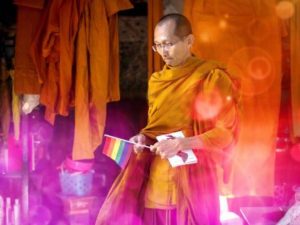
Sacca, or truthfulness, is the seventh of the ten paramis, or perfections. We usually think of truthfulness in relation to speech, and this is the basis for the fourth of the five precepts for lay Buddhists offered by Shakyamuni Buddha:
Musavada veramani sikkhapadam samadiyami (I observe the precept of abstaining from falsehood)*
Like many of the Buddha’s teachings, the fourth precept is phrased in negation, so here speaking truthfully is implied when we abstain from falsehood. It’s not hard to imagine why speaking truthfully is one of the paramis, or spiritual perfections. How can we calm the mind and cultivate boundless love if we go around lying and then have to worry about getting caught? Truthfulness in speech requires a deep understanding of the stress caused by falsehood and it also takes courage. There are times when speaking the truth could reveal parts of ourselves that we would rather hide, risk damaging our relationships with others, and even threaten our lives. Truth-telling, as it were, can be a risky business.
Fortunately, the Buddha provided more guidance on skillful speech than simply abstaining from falsehood. In the Anguttara Nikaya, the Buddha offers a clarification: “Monks, a statement endowed with five factors is well-spoken, not ill-spoken. It is blameless and unfaulted by knowledgeable people. Which five? It is spoken at the right time. It is spoken in truth. It is spoken affectionately. It is spoken beneficially. It is spoken with a mind of good will.”** Here, the Buddha shows us that there is more to sacca than meets the eye.
The perfection of truthfulness goes beyond what we say and do not say. To develop truthfulness, we have to learn to be true with ourselves. This is even more difficult than speaking skillfully. Through meditation practice, we enter into a radical process of looking within deeply to understand both ourselves and the world more clearly. We start to notice how our thoughts, perceptions, and reactions are constantly changing and not completely accurate. The stories we tell ourselves about how good we are, or how awful we are, never capture the whole picture. And the stories we tell ourselves about other people are often even further from the truth!
The famous parable of the blind men and the elephant illustrates this well. The king of the ancient Indian city of Savatthi gathered all the people in the kingdom who had been blind from birth and had them stand around an elephant. To some of the blind men he presented a tusk, to others an ear, to others a leg, and so on. When they were asked to describe the elephant, the first group said that it was like a water jar, the next a winnowing basket, then a plowshare, a plow pole, a post, a mortar, a pestle, and finally a broom. The blind men got so upset with one another and their contradictory impressions of the elephant that they all started fighting. The Buddha related this story in response to some wandering ascetics who had come to the Buddha to debate the nature of the universe, telling them that they were no different from the blind men. The Buddha finished with this verse:
Some recluses and Brahmans, so called,
Are deeply attached to their own views;
People who only see one side of things
Engage in quarrels and disputes.***
How can we cultivate truthfulness when we are predisposed to seeing only one side of things (falsehood) and being attached to our own views? We must train ourselves. Practicing mindfulness, the awareness of things as they are based in awareness of the breath, trains our minds to notice the jump from sense perception to reaction and instead come closer to the truth of the experience. This simple training can literally change our brains and thus transform our lives and even the world. It starts with very small things, such as asking ourselves, “Are you sure?” This can give us pause to remember that there are more parts to the elephant in the mind than what’s been put in front of us, so to speak. I’ve noticed that when I use words like everybody, nobody, always, and never, I’m committing some form of falsehood because I’m stuck in a view that is incomplete. Many people may do certain things, but is there anything that absolutely everybody does? Other than basic bodily functions and eventually dying, no. When I hear such words come up in my thoughts or speech—“Nobody will listen to me,” “It’s never going to change,” “Why is everyone so rude?”—I don’t even need to ask myself if it’s true. It’s clearly a falsehood. Then I correct myself by thinking or saying something more truthful, such as, “I don’t feel listened to right now,” “I’m feeling frustrated because I want things to change,” and “These two people acted in a way that was hard to receive.” This requires taking the time to notice thoughts as thoughts rather than fixed reality and meeting thoughts with curiosity. By being truthful with my negative thoughts and speech, it becomes easy to see that things are rarely as dire as I made them out to be.
Sacca can also be translated to mean what is real. When we look more and more deeply into our experience of life, can we be sure we know what is real? As quantum physics presents us with more and more findings that throw our understanding of life and the universe into question, “What is real?” becomes an ever-changing exploration with fewer and fewer fixed answers. The Buddha understood this in the teaching on impermanence. We know that everything changes, but it’s hard to integrate this insight into our daily lives.
In the Plum Village tradition of Thich Nhat Hanh, we have a modern rendering of the Bodhisattva Vows called the Fourteen Mindfulness Trainings of the Order of Interbeing. Created in 1966 in Vietnam during the war, these came about from an effort to modernize Buddhism and take the practice out of the temple through the continuous practice of mindfulness, ethical behavior, and compassionate action in society.**** The second training (rather than precept) provides a way to cultivate the perfection of truthfulness that is in accord with impermanence, to counterbalance our tendency to favor one-sided, cherished views.
The Second Mindfulness Training: Non-attachment to Views
Aware of the suffering created by attachment to views and wrong perceptions, we are determined to avoid being narrow-minded and bound to present views. We are committed to learning and practicing non-attachment to views and being open to others’ experiences and insights in order to benefit from the collective wisdom. We are aware that the knowledge we presently possess is not changeless, absolute truth. Insight is revealed through the practice of compassionate listening, deep looking, and letting go of notions rather than through the accumulation of intellectual knowledge. Truth is found in life, and we will observe life within and around us in every moment, ready to learn throughout our lives.
There is no one truth. There are many truths, and most change over time. This goes against what we were trained to do in school: to learn the right answer in order to get a good grade. It goes against what many sects and religions teach: that their way is best and the only path to salvation. It goes against the very human tendency to want to figure things out and be done with it. It takes time and effort to look deeply and to reconsider our views, but the suffering caused by falsehoods, when spoken to others or believed by ourselves, is actually far more taxing once we learn how to notice the subtleties. The Second Training is more than a simple guidepost. It points to the very nature of awakening itself, an embodiment of the insight of impermanence and interdependence. It’s a tall order, but we only have to start where we are. The perfection of truthfulness lies not in finding the one truth, but in being open to the many truths that present themselves as we journey through life. And it’s simple as asking, “Are you sure?”
* http://www.urbandharma.org/udharma2/5precepts.html
** http://www.accesstoinsight.org/tipitaka/an/an05/an05.198.than.html
*** http://www.accesstoinsight.org/tipitaka/kn/ud/ud.6.04.irel.html











